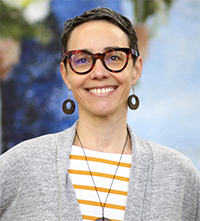LATINX + PHILANTHROPY: Violeta Rubiani
 I started writing this piece in hopes of highlighting the vibrancy, resiliency, and rich diversity of my Latinx community.
I started writing this piece in hopes of highlighting the vibrancy, resiliency, and rich diversity of my Latinx community.
My research began by googling “Latinos in the U.S.” Instead of greatness, however, I was slapped with thousands of articles and reports painting a bleak picture of our community: Latinxs are less likely than non-Hispanic Whites to be homeowners, to graduate high school, to have generational wealth, or to have college and professional degrees; we are more likely to be profiled by police, to work in low-wage jobs, and to have high incidences of unwanted pregnancies, diabetes and heart disease; and so on.
Finding any evidence of our excellence, our contributions, our gifts turned out to be more more difficult than I thought. But I’m not surprised, as it only confirmed what I learned the minute I landed in the U.S. 26 years ago: the predominant colonial and American narratives—the ones everyone believes and we Latinxs, foreign and domestic, often internalize—is that there’s something wrong with our culture, our language, and traditions—with us as a people. It takes significant effort to ignore the persistent and pervasive story that our community is always in need but has nothing to offer. Even if we instinctively know better, the script that our collective history is one of deficiency, poverty and hardship is difficult—if not impossible—to flip. In the eyes of White America, it would seem, our pain (and the pain other communities of color suffer daily) is our only defining characteristic.
Reframing this narrative has too often led us to tie our worth to our economic contributions, such as:
- In 2017, Hispanic households earned more than $1 trillion, paid more than $252.2 billion in taxes (including $165.9 billion in federal income taxes and $86.3 billion in state and local taxes) and held more than $780.7 billion in spending power.
- Almost 12% of all Hispanic immigrant workers worked for their own business, making them 24.5% more likely to have their own business than the overall U.S. population.
- Voter turnout rate is high among registered Latino voters. About 80 to 83% of registered Hispanics vote in presidential elections.
- 20% of Hispanic immigrants who arrived between 2012-2017 had a bachelor’s degree, slightly higher than the U.S. national average of 19.7% for 2017.
- In Oregon, the agricultural, construction, food, and hospitality sectors would assuredly collapse without Latinx workers. During the pandemic, Latinxs were essential to the harvesting, preparing and serving of food; essential to keeping our stores stocked and our restaurants staffed; and essential to hotels, homes and offices being cleaned and disinfected. (Funny how being essential did not translate into better pay, safer working conditions, or federal or state unemployment assistance for undocumented folks.)
But Latinxs are not just good for America’s economy—we have contributed to its activism, its food traditions, its politics and everything in between. Where would the U.S. be without Alexandria Ocasio-Cortez or Sonia Sotomayor, Sylvia Rivera or Jean-Michelle Basquiat, Cristina Martínez or Tab Ramos? What would America be without Latinx culture, art, music, or dance?
In Oregon, Latinx leaders were directly responsible for—among thousands of other successful programs, organizations, and initiatives—the creation of one of the largest COVID relief fund for undocumented workers in the nation, proof that when they are trusted and resourced adequately, they can do amazing things. Here are a few of the emerging and established community organizers you should know about and invest in:
- Ana Molina at Beyond Toxics
- Blanca Gaytán at East County Rising
- Candace Ávalos at Verde
- Carmen Rubio, Portland City Councilor
- Dagoberto Morales at Únete Center for Farm Worker Advocacy
- Dawn Jones-Redstone, filmmaker
- Eddy Morales, Gresham City Councilor
- Emilly Prado, writer and cultural organizer
- Jaime Arredondo at Capaces Leadership Institute
- Marissa Zárate at Huerto de la Familia
- Miriam Vargas Corona at Unidos Bridging Community
- Osmani Alcaraz at VOZ Workers’ Rights Project
- Perla Álvarez at Oregon Voice
- Tony DeFalco at Latino Network
- Reyna López at PCUN
- Sandra Hernández at Latinos Unidos Siempre
- Ubaldo Hernández at Columbia Riverkeeper and Comunidades
- Umí Vera at Familia Trans Queer Liberation Movement
- Virginia Camberos at Unite Oregon-Rogue Valley (Southern Oregon)
… and many, many, many more.
I encourage you to fund them and their organizations often and generously. I also encourage you to challenge yourself to remain curious and reframe what you think you know about Latinxs in Oregon and beyond—yes, we’ll need support to upend the systems of injustice and oppression that have kept us from succeeding in many areas, but make no mistake: we are also gifted, resilient, creative, and hardworking. As our numbers grow, our fight for our community and our collective liberation will also intensify—we hope you’ll be a part of it.
– Violeta Rubiani
